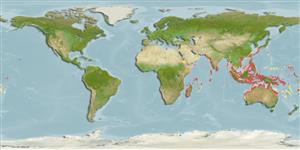Preferred temperature (Ref.
115969): 25 - 29.3, mean 28.4 (based on 2783 cells).
Phylogenetic diversity index (Ref.
82804): PD
50 = 0.5000 [Uniqueness, from 0.5 = low to 2.0 = high].
Bayesian length-weight: a=0.01023 (0.00477 - 0.02194), b=3.02 (2.84 - 3.20), in cm Total Length, based on LWR estimates for this (Sub)family-body shape (Ref.
93245).
Mức dinh dưỡng (Ref.
69278): 3.5 ±0.4 se; based on size and trophs of closest relatives
Thích nghi nhanh (Ref.
120179): Trung bình, thời gian nhân đôi của chủng quần tối thiểu là 1.4 - 4.4 năm (Preliminary K or Fecundity.).
Fishing Vulnerability (Ref.
59153): Low vulnerability (12 of 100).
